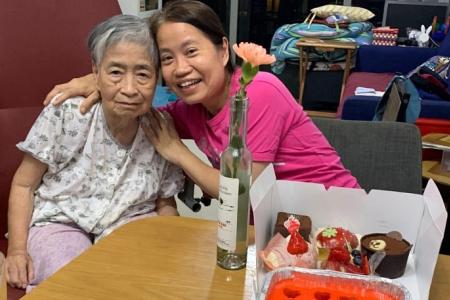No longer alone: Dementia caregiver finds community
Ms Serene Low, 58, often felt at a loss caring for her 84-year-old mother who was diagnosed with dementia in 2020.
The teacher, who is married with three children, said she was quite clueless about how to communicate with her mother and manage her behaviour – especially in the initial months after the diagnosis.
For example, her mother would wake up in the middle of the night and start screaming, and Ms Low had to calm her down. The frequency of such incidents has eased with medication.
The senior would also throw tantrums during the day.
Those stresses took a toll on Ms Low’s sleep pattern and well-being, and she had to stop work for more than a year.
Ms Low has a helper to help her care for her mother, who needs assistance with daily activities such as bathing.
She added: “My main challenge is the emotional upheavals I go through because of her difficult behaviour. I felt guilty feeling that she has disrupted my life, like I was being selfish.”
But what helped was finding support from other caregivers and learning caregiving tips from a support group for caregivers of dementia patients run by social service agency Care Corner Singapore.
The support group now meets at a new Care Corner centre, called Space@214, that is located at Block 214 Toa Payoh Lorong 8. The centre officially opened on Nov 9.
Mr Joe Tan, head of integrated case management at Care Corner Seniors Services, said that Toa Payoh has an ageing population, with more than one in five residents aged 65 and older.
So Care Corner started Space@214 to address the need for easily accessible mental health services as well as active ageing and caregiving programmes in the community, he said.
Other estates with a higher proportion of seniors include Ang Mo Kio, Bukit Merah and Jurong East, according to the Population Trends 2024 report published by the Department of Statistics.
In these areas, more than one in five residents was aged 65 and older.
Space@214 runs mental health programmes and services such as screening for depression and dementia, and counselling for those who need emotional support. It also runs active ageing activities such as exercise classes, karaoke and social gatherings.
One of its programmes is Mindful Steps, which is a brisk-walking programme that incorporates cognitive stimulation and mindfulness activities. It also caters to seniors in wheelchairs.
Through these walks, participants are taught to be aware of their emotions and thought processes, and taught skills to cope with their stresses and worries.
Mr Tan said that while seniors may not want to join a mental health programme, due to the stigma surrounding mental health issues, they are open to exercise programmes. Hence, Mindful Steps marries both the physical and mental health aspects.
He said they have seen encouraging signs in residents who use mobility aids and previously used to just stay at home. But after joining the programme, they found support from others and their moods improved.
With an ageing community, the need for dementia support services and support services for caregivers will increase, Mr Tan said.
Many of the caregivers they see are in their 50s and older, and who are caring for their parents in their 70s and 80s.
Mr Tan said: “Caregivers often don’t identify themselves as a caregiver but as a child or spouse. Yet the burden (of caregiving) is on them and they also need support.”
He said some caregivers they have met gave up their jobs to look after a loved one, while others neglect their own health due to the toll of caregiving and end up suffering from depression or other conditions.
Members of the caregivers support group meet once a month for talks and activities. These talks include teaching them how to handle the challenging behaviour of dementia patients and understanding their own emotions and stresses.
Joining the support group helped Ms Low learn more about caring for her mother from other caregivers and the professionals.
The support group has a WhatsApp chat where members encourage one another and share tips and their experiences caring for their loved ones.
She said: “Caregiving can feel very lonely. The mutual support and encouragement helps me feel that I’m not alone.
“I feel more light-hearted after sharing the pain I go through with somebody. I’m more at peace with the caregiving journey now.”
Get The New Paper on your phone with the free TNP app. Download from the Apple App Store or Google Play Store now


